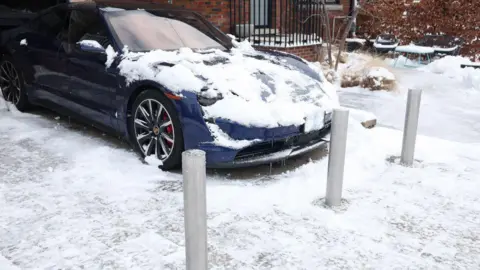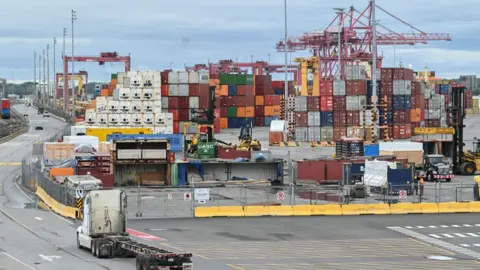How Canada became a car theft capital of the world

By Nadine Yousif, BBC News, Toronto
Logan LaFarniere woke up one October morning in 2022 to an empty driveway.
His brand new Ram Rebel truck, which he’d bought a year and a half ago, was missing. His security camera captured two hooded men breaking into the pickup in the dead of night outside of his Milton, Ontario home, and driving it away with ease.
A few months later, that very same truck appeared on a website of vehicles for sale in Ghana, an ocean and some 8,500km away.
“The dead giveaway was the laptop holder that we had installed in the back of the driver’s seat for my son, and in it was garbage that he had put in there,” Mr LaFerniere told the BBC.
That same clutter was visible in photos of the car listing, he said.
“There was no doubt in my mind that it was my vehicle.”
Mr LaFarniere’s story is hardly unique. In 2022, more than 105,000 cars were stolen in Canada – about five cars per minute. Among the victims was Canada’s very own federal justice minister, whose government-issued Toyota Highlander XLE was taken twice by thieves.
Early this summer, Interpol listed Canada among the top 10 worst countries for car thefts out of 137 in its database – a “remarkable” feat, said a spokesperson, considering the country only began integrating their data with the international police organisation in February.
Authorities say once these cars are stolen, they are either used to carry out other violent crimes, sold domestically to other unsuspecting Canadians, or shipped overseas to be resold.
Interpol says it has detected more than 1,500 cars around the world that have been stolen from Canada since February, and around 200 more continue to be identified each week, usually at ports in other countries.
Car theft is such an epidemic that it was declared a “national crisis” by the Insurance Bureau of Canada, which says insurers have had to pay out more than C$1.5bn ($1bn; £860m) in vehicle theft claims last year.
The problem has forced police jurisdictions across the country to issue public bulletins on how to protect vehicles from theft.
Meanwhile, some Canadians have taken matters into their own hands, doing everything from installing trackers on their cars to hiring private neighbourhood security.
Some who can afford it have even installed retractable bollards in their driveways – similar to those seen at banks and embassies – to try and deter thieves.
 Getty Images
Getty ImagesNauman Khan, who lives in Mississauga, a city just outside Toronto, started a bollard-installation business after he and his brother were both victims of car thefts.
In one attempt, Mr Khan said the thieves broke into his home while his wife and young children were sleeping. They were looking for the keys to his Mercedes GLE parked out front, he said, but ran after he confronted them.
After that “traumatic” experience, they sold their cars except for two “humble” family vehicles.
Through his business, Mr Khan said he now hears similar stories from people throughout the region of Toronto.
“It’s been very busy,” he said. “We had one client whose street had so many home invasions that he’d hired a security guard every night outside his house because he just didn’t feel safe.”
The pervasiveness of car thefts in Canada is surprising given how small the country’s population is compared to the US and the UK – other countries with high rates of such crime, says Alexis Piquero, Director of the US Bureau of Justice Statistics.
“(Canada) also doesn’t have as many port cities as the US does,” said Mr Piquero.
While the US, Canada and the UK have all experienced a spike in car thefts since the Covid-19 pandemic, Canada’s rate of thefts (262.5 per 100,000 people) is higher than that of England and Wales (220 per 100,000 people), according to the latest available data from each country.
It is also fairly close to that of the US, which sits at around 300 vehicle thefts per 100,000 people, based on 2022 data.
The rise in recent years is partly due to a pandemic-driven global car shortage that has increased demand for both used and new vehicles.
There is also a growing market for certain car models internationally, making auto theft a top revenue generator for organised crime groups, said Elliott Silverstein, director of government relations at the Canadian Automobile Association.
But Mr Silverstein said the way that Canada’s ports operate make them more vulnerable to this type of theft than other countries.
“In the port system, there’s a greater focus on what is coming into the country than what is exiting the country,” he said, adding that once the vehicles are packed up in shipping containers at a port it becomes harder to get to them.
Police have managed to recover some stolen cars.
In October, the Toronto Police Service announced an 11-month investigation that recovered 1,080 vehicles worth around C$60m. More than 550 charges were laid as a result.
And between mid-December and the end of March, border and police officers found nearly 600 stolen vehicles at the Port of Montreal after inspecting 400 shipping containers.
These types of operations, however, can be difficult to carry out given the volume of merchandise that moves through that port, experts have said. Around 1.7 million containers moved through the Port of Montreal in 2023 alone.
Port staff also do not have the authority to inspect containers in most cases, and in customs-controlled areas only border officers can open a container without a warrant.
At the same time, the Canada Border Services Agency (CBSA) has been grappling with chronic understaffing, according to a report submitted by its union to the government in April.
 AFP via Getty Images
AFP via Getty ImagesOutdated technology is also an issue.
Patrick Brown, the mayor of Brampton – another Ontario city hard-hit by car thefts – recently paid a visit to the Port Newark Container Terminal in New Jersey to compare inspection tactics between the US and Canada.
He told the National Post newspaper that US authorities have “got scanners. They measure density. They work closely with local law enforcement”.
“These are things that we don’t do in Canada,” he said.
In May, the Canadian government said it would invest millions to bolster the CBSA’s ability to search shipping containers. Police will also get additional money to combat auto theft in their communities.
But Mr Silverstein said he believes a missing puzzle piece is auto manufacturers themselves.
“Everyone is talking about trying to recover vehicles, and a lot of my focus has been on why we are not making the vehicles tougher to steal in the first place,” he said.
In the meantime, car owners like Mr LaFarniere are still grappling with what to do to keep their vehicles safe.
After his Ram Rebel truck was stolen, he replaced it with a Toyota Tundra – a vehicle that Mr LaFarniere described as his “dream truck”.
This time, he installed an engine immobiliser on it to prevent thieves from being able to easily start the car. He also equipped it with a tag tracker in case it did get stolen, and added a club on the steering wheel for good measure.
Thieves were undeterred. A pair came to Mr LaFarniere’s driveway, this time to steal the Tundra. They had a harder time, however, and resorted to shattering the back window to get inside.
The commotion woke Mr LaFarniere and he called 911. But the thieves managed to run away in the four minutes it took for police to arrive.
He paid to repair his brand new truck and then sold it.
The whole ordeal, he said, was nothing short of “disheartening”.
Source link





